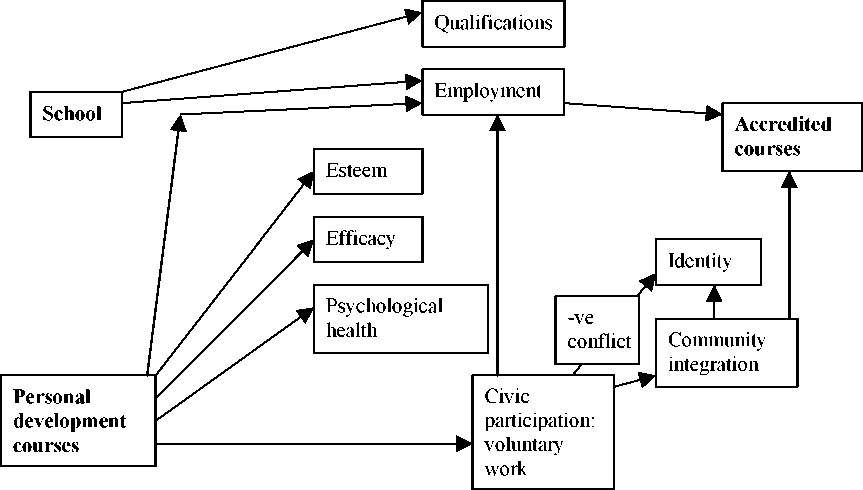work in health led to employment as a project worker in the Nottingham Health
Action Zone.
Figure 4: Juliet

Juliet’s school experience was positive and after CSEs she went on to ‘A’ levels,
which she considers in retrospect to be a mistake, as they were too demanding for her.
Through employment she gained a library assistant’s certificate. She also has a
certificate in ‘playgroup’. In recent years, she has undertaken a number of courses
such as ‘make your life experience count’, ‘women’s health’ and ‘counselling’. She is
currently studying for the Community Development Award, which is largely APL
(Accreditation of Prior Learning).
Juliet’s learning trajectory has involved a major juggling act in respect of her personal
identity. As a working-class mother, her primary identity was for many years as a
child-rearer. She has undertaken a number of WEA courses, straddling the boundaries
between personal development and community development. These have led both to a
snowballing involvement in voluntary activities, and to employment in a Health
Action Zone. Paid and unpaid work are inextricably interrelated, as are learning and
doing. They feed off and lead to each other. But whereas being a mother is in her
social milieu an acceptable form of unpaid work, getting involved in voluntary
activity to the extent she has is, as she describes it, less easily acceptable, and she ran
the risk of being labelled a middle-class do-gooder; in this milieu, work in the public
sphere ought usually to be remunerated. So there have been risks in her learning. She
has not been deterred by this but she also points out how voluntary work and the
learning that goes with it (as part of the work or through the training that accompanies
it) also open up opportunities for paid employment:
65
More intriguing information
1. The name is absent2. Trade and Empire, 1700-1870
3. The name is absent
4. Qualification-Mismatch and Long-Term Unemployment in a Growth-Matching Model
5. Trade Liberalization, Firm Performance and Labour Market Outcomes in the Developing World: What Can We Learn from Micro-LevelData?
6. EU Preferential Partners in Search of New Policy Strategies for Agriculture: The Case of Citrus Sector in Trinidad and Tobago
7. Thresholds for Employment and Unemployment - a Spatial Analysis of German Regional Labour Markets 1992-2000
8. Cancer-related electronic support groups as navigation-aids: Overcoming geographic barriers
9. Business Networks and Performance: A Spatial Approach
10. Neural Network Modelling of Constrained Spatial Interaction Flows